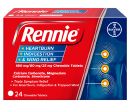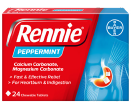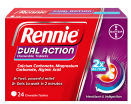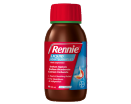PRODUCT RECOMMENDATION
This table shows the differences between some of the products in the Rennie range to help you explain the available options to customers.Scroll through the table to see the differences between some of the products in the Rennie range to help you explain the available options to customers. Rennie Dual Action was previously known as Rennie Extra tablets if a customer is specifically looking for these.
PRODUCT |
RENNIE
|
RENNIE
|
RENNIE
|
RENNIE HEARTBURN, INDIGESTION AND WIND RELIEF Each tablet contains calcium carbonate 680mg, magnesium carbonate 80mg, simeticone 25mg Each tablet contains calcium carbonate 680mg, magnesium carbonate 80mg, simeticone 25mg
|
| FORMAT | Chewable tablet | Chewable tablet | Liquid | Chewable tablet |
| HEARTBURN |  |
 |
 |
 |
| INDIGESTION |  |
 |
 |
 |
| WIND RELIEF |  |
|||
| TYPE OF ACTIVE | Antacid | Antacid and alginate | Antacid and alginate | Antacid and simeticone |
Click next to update your learning record.
REFERENCES
1. https://www.nhs.uk/conditions/heartburn-and-acid-reflux/
2. https://www.nhs.uk/conditions/indigestion/
3. https://patient.info/digestive-health/dyspepsia-indigestion
Online references last accessed January 2021.
RENNIE PEPPERMINT contains calcium carbonate and heavy magnesium carbonate. Indication: For the relief of heartburn and indigestion. Dosage and Administration: Two tablets to be sucked or chewed as required, preferably one hour after meals and before going to bed and in between, in cases of heartburn or gastric pain. Maximum daily dose of 10 tablets a day (8g calcium carbonate). Not recommended for children under 12 years. Contraindications: hypersensitivity to ingredients, hypercalcaemia or conditions resulting in hypercalcaemia, nephrolithiasis due to calculi containing calcium deposits, severe renal insufficiency and hypophosphataemia. Warnings and Precautions: Prolonged use should be avoided (medical advice should be sought if symptoms persist or only partly disappear after 14 days). Should be used with caution in patients with mild to moderate renal impairment; hypercalciuria; rare hereditary fructose intolerance, glucosegalactose malabsorption or sucrase-isomaltase insufficiency. Not to be taken with large amounts of milk or dairy products. Interactions - antibiotics, cardiac glycosides, levothyroxine, eltrombopag, fluorides, iron-containing products, phosphates, thiazide diuretics. It is preferable to take separately from other drugs, allowing at least 4 hours before or after taking eltrombopag and at least a 1-2 hour interval for all other drugs. Side effects: Very rarely hypersensitivity reactions; hypermagnesaemia or hypercalcaemia and alkalosis, especially in patients with impaired renal function, which may give rise to gastric symptoms (nausea, vomiting, stomach discomfort and diarrhoea) and muscular weakness. Side effects in the context of milk-alkali syndrome: ageusia, calcinosis, asthenia, headache and azotemia. Use in Pregnancy: Rennie can be used during pregnancy and lactation. Pregnant women should strictly limit their use of tablets to the maximum recommended daily dose and should avoid concomitant, excessive intake of milk and dairy products to prevent calcium overload. RRP (excluding VAT): 12's £1.74, 24's £2.08, 48's £3.33, 72's £4.41, 96's £4.99. MA Number: PL 00010/0353. MA Holder: Bayer plc, 400 South Oak Way, Reading RG2 6AD. Legal Category: GSL. Date of Preparation: January 2021. ® Registered trademark of Bayer AG.
RENNIE DUAL ACTION TABLETS contains alginic acid, calcium carbonate and heavy magnesium carbonate. Indication: For symptomatic treatment of heartburn and indigestion. Dosage and Administration: Two tablets to be chewed as required, preferably one hour after meals and before going to bed. An additional dose can be taken in between in the case of heartburn. Maximum daily dose of 12 tablets a day (8g calcium carbonate). Not recommended for children under 12 years. Contraindications: hypersensitivity to ingredients, hypercalcaemia or conditions resulting in hypercalcaemia, nephrolithiasis due to calculi containing calcium deposits, severe renal insufficiency and pre-existing hypophosphataemia. Warnings and Precautions: Prolonged use should be avoided (medical advice should be sought if symptoms persist or only partly disappear after 14 days). Should be used with caution in patients with renal impairment; constipation, haemorrhoids and sarcoidosis; hypercalciuria; rare hereditary fructose intolerance, glucose-galactose malabsorption or sucrase-isomaltase insufficiency. Not to be taken with large amounts of milk or dairy products. Interactions - antibiotics, cardiac glycosides, levothyroxine, eltrombopag, fluorides, iron-containing products, phosphates, thiazide diuretics. It is preferable to take separately from other drugs, allowing at least 1-2 hours after. Side effects: Very rarely hypersensitivity reactions; hypermagnesaemia or hypercalcaemia and alkalosis, especially in patients with impaired renal function, which may give rise to gastric symptoms (nausea, vomiting, stomach discomfort, fatigue, confusion, polyuria, polydypsia, dehydration and diarrhoea) and muscular weakness. In single cases a possible relationship between calcium carbonate and appendicitis, gastrointestinal haemorrhage, intestinal blockage or oedema has been reported. Side effects in the context of milkalkali syndrome: ageusia, calcinosis, asthenia, headache and azotemia. Use in Pregnancy: Rennie can be used during pregnancy and lactation. Pregnant women should strictly limit their use of tablets to the maximum recommended daily dose and should avoid concomitant, excessive intake of milk and dairy products to prevent calcium overload. RRP (excluding VAT): 12's £2.08, 24's £3.33. MA Number: PL 00010/0514. MA Holder: Bayer plc, 400 South Oak Way, Reading RG2 6AD. Legal Category: GSL. Date of Preparation: January 2021. ® Registered trademark of Bayer AG.
RENNIE LIQUID HEARTBURN RELIEF ORAL SUSPENSION (Sodium Bicarbonate 133.5mg, Sodium Alginate 250mg, Calcium Carbonate 80mg per 5 ml). Indications: Heartburn, including heartburn during pregnancy, and indigestion. Dosage and Administration: For oral use only. Two to four 5 ml spoonfuls in adults and children over 12 years. One to two 5ml spoonfuls in children 6-12 years. Not recommended in children under six years of age. Doses should be taken after meals and at bedtime. Contraindications: Patients with known or suspected hypersensitivity to the active substances or to any of the excipients, including methyl parahydroxybenzoate (E218) and propyl parahydroxybenzoate (E216). Warnings and Precautions: If symptoms do not improve after seven days, the clinical situation should be reviewed. Care should be exercised in patients on a sodium restricted diet (each 10 ml dose contains 6 mmol sodium). Due to calcium content, care needs to be taken in patients with hypercalcaemia, nephrocalcinosis and recurrent calcium containing renal calculi. Rennie Liquid should not be taken within 1 to 2 hours of taking other medicines by mouth, or for more than 2 weeks. Parahydroxybenzoates (E214, E216) may cause allergic reactions (possibly delayed). Side effects: Very rare: Anaphylactic and anaphylactoid reactions; hypersensitivity reactions such as urticaria; respiratory effects such as bronchospasm. Use in Pregnancy: Rennie Liquid can be used during pregnancy, if clinically needed, and during breast-feeding. RRP (excluding VAT): 150ml £3.33, 250ml £4.58. MA Number: PL 04917/0027. MA Holder: Pinewood Laboratories Limited, Ballymacarbry, Clonmel, Co. Tipperary, Ireland. Legal Category: GSL. Date of Preparation: January 2021.
RENNIE HEARTBURN, INDIGESTION AND WIND RELIEF 680MG/80MG/25MG CHEWABLE TABLETS contain calcium carbonate, heavy magnesium carbonate, simeticone. Indication: For the relief of heartburn, indigestion, uncomfortable bloating and painful trapped wind. Dosage and Administration: One or two tablets to be sucked or chewed as required. Maximum daily dose of 11 tablets a day (8g calcium carbonate). Not recommended for children under 12 years. Contraindications: hypersensitivity to ingredients, hypercalcaemia or conditions resulting in hypercalcaemia, nephrolithiasis due to calculi containing calcium deposits, severe renal insufficiency and hypophosphataemia. Warnings and Precautions: Prolonged use should be avoided (medical advice should be sought if symptoms persist or only partly disappear after 14 days). Should be used with caution in patients with mild to moderate renal impairment; hypercalciuria; sorbitol or fructose intolerance. Not to be taken with large amounts of milk or dairy products. Interactions - antibiotics, cardiac glycosides, levothyroxine, eltrombopag, fluorides, iron-containing products, phosphates, thiazide diuretics. It is preferable to take separately from other drugs, allowing at least 4 hours before or after taking eltrombopag and a 1-2 hour interval for all other drugs. Side effects: Very rarely hypersensitivity reactions; hypermagnesaemia or hypercalcaemia and alkalosis, especially in patients with impaired renal function, which may give rise to gastric symptoms (nausea, vomiting, stomach discomfort and diarrhoea) and muscular weakness. Side effects in the context of milk-alkali syndrome: ageusia, calcinosis, asthenia, headache and azotemia. Use in Pregnancy: Rennie can be used during pregnancy and lactation. Pregnant women should strictly limit their use of tablets to the maximum recommended daily dose and should avoid concomitant, excessive intake of milk and dairy products to prevent calcium overload. RRP (excluding VAT): 12's £2.24, 24's £3.83. MA Number: PL 00010/0350. MA Holder: Bayer plc, 400 South Oak Way, Reading, RG2 6AD, UK. Legal Category: GSL. Date of Preparation: January 2021. ® Registered trademark of Bayer AG.



